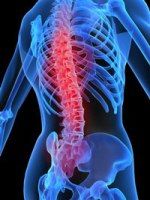Protein identified as critical to insulating the body's wiring could also become treatment target
Advertisement
A new protein identified as critical to insulating the wiring that connects the brain and body could one day be a treatment target for divergent diseases, from rare ones that lower the pain threshold to cancer, Medical College of Georgia researchers say. They report in Proceedings of the National Academy of Sciences that in the peripheral nervous system that controls arms and legs, the protein erbin regulates the protein neuregulin 1, stabilizing and interacting with the ErbB2 receptor on Schwann cells so they can make myelin, which insulates the wiring. Their studies in mice have shown that when erbin is missing or mutated, the insulation is inadequate, slowing communication.
"Erbin is like a tuner to make signaling stronger or weaker," says Dr. Lin Mei, the study's corresponding author and director of MCG's Institute of Molecular Medicine and Genetics.
Without erbin, the myelin production system falls apart. Eventually raw, over-exposed nerves can die.
"Receptors for neuregulin 1 just get degraded and lost," says Dr. Mei, Georgia Research Alliance Eminent Scholar in Neuroscience. "Schwann cells can see neuregulin 1 sitting there but they can't do anything without the receptor."
Impaired myelin formation and maintenance is implicated in a variety of neurological and psychiatric diseases including schizophrenia, multiple sclerosis and Charcot-Marie-Tooth neuropathy, a genetic, progressive disease that weakens muscles. Cancer is an issue because the ErbB2 receptor also is an oncogene highly expressed in tumors. ErbB2 helps cancer cells grow and spread so finding its role in the receptor's stability and function provides a potential new site for targeted cancer therapy, says Dr. Yanmei Tao says, postdoctoral fellow in neurobiology and the study's first author. In fact, antibodies to ErbB2 already are available to patients with breast and prostate cancers.
"In any given nerve, some axons are wrapped heavily by myelin," Dr. Mei says. "It's based on nerve function. For example, if the nerve needs more speed in conducting a signal or information, like motor nerves, they would be wrapped more."
In fact, erbin is enriched in regions with a lot of myelinated axons, such as the sciatic nerve, which runs down the lower back into the legs, the researchers found. Dr. Mei also is exploring the role of neuregulin 1 in cell talk in the brain. He and collaborators have identified a sort of a sort of check and balance for brain cell activity managed by neuregulin-1 in the area of the brain where complex reasoning and decisions about appropriate social behavior occur. They showed that neuregulin-1 and another receptor, ErbB4, help keep a healthy balance between excitation and inhibition of brain cells.
Other news from the department science
Most read news
More news from our other portals
See the theme worlds for related content
Topic world Antibodies
Antibodies are specialized molecules of our immune system that can specifically recognize and neutralize pathogens or foreign substances. Antibody research in biotech and pharma has recognized this natural defense potential and is working intensively to make it therapeutically useful. From monoclonal antibodies used against cancer or autoimmune diseases to antibody-drug conjugates that specifically transport drugs to disease cells - the possibilities are enormous

Topic world Antibodies
Antibodies are specialized molecules of our immune system that can specifically recognize and neutralize pathogens or foreign substances. Antibody research in biotech and pharma has recognized this natural defense potential and is working intensively to make it therapeutically useful. From monoclonal antibodies used against cancer or autoimmune diseases to antibody-drug conjugates that specifically transport drugs to disease cells - the possibilities are enormous


























































